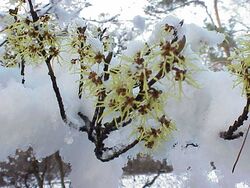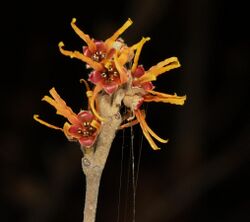Biology:Hamamelis mollis
| Hamamelis mollis | |
|---|---|

| |
| Flowers | |
| Scientific classification | |
| Kingdom: | Plantae |
| Clade: | Tracheophytes |
| Clade: | Angiosperms |
| Clade: | Eudicots |
| Order: | Saxifragales |
| Family: | Hamamelidaceae |
| Genus: | Hamamelis |
| Species: | H. mollis
|
| Binomial name | |
| Hamamelis mollis Oliv.
| |
| Chinese name |
|---|
Hamamelis mollis, also known as Chinese witch hazel,[1] is a species of flowering plant in the witch hazel family Hamamelidaceae, native to central and eastern China, in Anhui, Guangxi, Hubei, Hunan, Jiangxi, Sichuan, and Zhejiang.[2]
It is a deciduous large shrub or small tree growing to 8 m (26 ft) tall. The leaves are oval, 8–15 cm (3 1⁄4–6 in) long and 6–10 cm (2 1⁄4–4 in) broad, oblique at the base, acute or rounded at the apex, with a wavy-toothed or shallowly lobed margin, and a short petiole 6–10 mm long; they are dark green and thinly hairy above, and grey beneath with dense grey hairs. The Latin term mollis means "soft", and refers to the felted leaves, which turn yellow in autumn.[3] The flowers are yellow, often with a red base, with four ribbon-shaped petals 15 mm (0.59 in) long and four short stamens, and grow in clusters; flowering is in late winter to early spring on the bare branches. The fruit is a hard woody capsule 12 mm (0.47 in) long, which splits explosively at the apex at maturity one year after pollination, ejecting the two shiny black seeds from the parent plant.[2]
Cultivation and uses
H. mollis is widely grown as an ornamental plant, valued for the strongly-scented flowers appearing in winter when little else is growing. Numerous cultivars have been selected, for variation in flower colour and size, and in shrub size and habit.[4] It is also one of the two parents of the popular garden hybrid H. × intermedia (the other parent is H. japonica).[1][5]
The cultivars ‘Jermyns Gold’[6] and ‘Wisley Supreme’[7] have gained the Royal Horticultural Society’s Award of Garden Merit.[8]
References
- ↑ Jump up to: 1.0 1.1 RHS A-Z encyclopedia of garden plants. United Kingdom: Dorling Kindersley. 2008. pp. 1136. ISBN 978-1405332965.
- ↑ Jump up to: 2.0 2.1 Zhang, Zhi-Yun; Zhang, Hongda; Endress, Peter K., "Hamamelis mollis", Flora of China, 9, http://www.efloras.org/florataxon.aspx?flora_id=2&taxon_id=200010554
- ↑ Harrison, Lorraine (2012). RHS Latin for gardeners. United Kingdom: Mitchell Beazley. pp. 224. ISBN 9781845337315.
- ↑ Huxley, A., ed. (1992). New RHS Dictionary of Gardening. Macmillan ISBN:0-333-47494-5.
- ↑ "RHS Plant Selector - Hamamelis mollis". https://www.rhs.org.uk/plants/8246/hamamelis-mollis/details.
- ↑ "RHS Plantfinder - Hamamelis mollis 'Jermyns Gold'". https://www.rhs.org.uk/Plants/55086/i-Hamamelis-mollis-i-Jermyns-Gold/Details. Retrieved 2 March 2018.
- ↑ "RHS Plantfinder - Hamamelis mollis 'Wisley Supreme'". https://www.rhs.org.uk/Plants/130387/i-Hamamelis-mollis-i-Wisley-Supreme/Details. Retrieved 2 March 2018.
- ↑ "AGM Plants - Ornamental". Royal Horticultural Society. July 2017. p. 45. https://www.rhs.org.uk/plants/pdfs/agm-lists/agm-ornamentals.pdf. Retrieved 2 March 2018.
External links
| Wikimedia Commons has media related to Hamamelis mollis. |
Wikidata ☰ Q1074130 entry
 |


